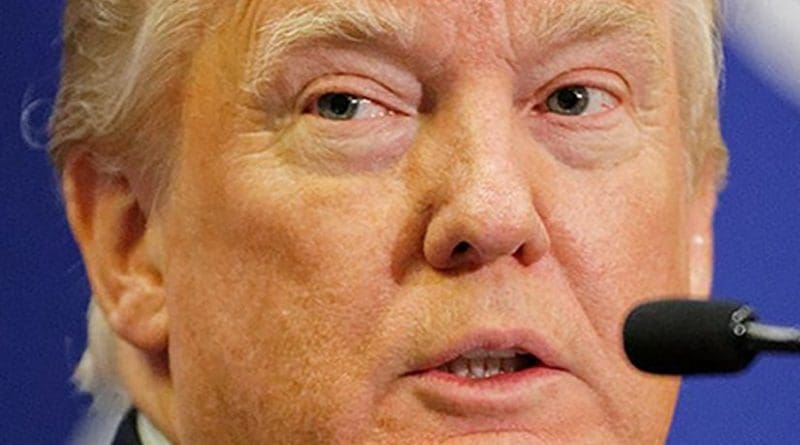Trumpism And US’ Next War – OpEd
There are many reasons to worry about world peace if, God forbid, the Republican candidate for US presidency, Donald Trump, is somehow elected as the next US president, irrespective of his lack of any political experience. The autocratic, xenophobic, ultra-nationalist “America first” Trump is definitely bad news for world peace and will likely embroil the United States in more costly adventures abroad as a direct result of his muscular, i.e., militaristic, approach to foreign policy issues, stemming from a self-defined “Trumpist” ideology that is akin to European fascism.
Like Hitler, who promised to restore greatness to the German nation and ended up delivering a generational fiasco, Trump’s slogan of “let’s make America great again” is likely destined to similar results, e.g., adding to America’s current woes through irresponsible militarism abroad.
A political novice whose political campaign is an extension of his reality TV show, Trump may be a master of media manipulation through his anti-politics counter-establishment facade, but he is apt to succumb to quick fix solution for complex foreign policy issues requiring patient diplomacy. A trigger-happy hawkish presidency will likely define Trump’s presidency, which might make aspects of the American military-industrial complex happy, yet overall will be detrimental to America’s national interests.
An important question is the future of US-Iran relations, which has experienced some positive jolts over the past two years as a result of the nuclear negotiations and some common cause in Iraq and Syria vis-a-vis jihadist terrorism. Will Trump the president continue on this path threaded by President Obama or, on the contrary, veer the US power on a collision course with Iran? Needless to say, the definite answer to this question depends on several intervening variables, such as the state of affairs in Persian Gulf, scene to past flare-ups between US and Iranian forces, as well as the implementation of the nuclear accord.
Concerning the latter, Trump is already on the record promising to scrap the nuclear deal once in the White House, although he has left the door ajar for a less drastic “restructuring” the agreement. With the US Congress plotting fresh anti-Iran bills, Trump’s presidency might facilitate those bills, thus introducing new thorns on the implementation of the nuclear agreement, perhaps to the point of instigating stern Iranian reactions. Convinced that the deal is a bad deal in dire need of being re-negotiated, President Trump would likely resort to pressure tactics on Iran that could backfire on the agreement and bring it to the verge of collapse as early as 2017 or 2018. Any flashpoint in the Persian Gulf, such as accidental warfare, would definitely accelerate this process and spell serious trouble for the agreement, known as the Joint Comprehensive Plan of Action (JCPOA), adamantly opposed by Saudi Arabia and, to a lesser extent, Israel.
What is clear, however, is that Trump holds a Manichean view of the Islamic Republic of Iran as a “terrorist state” that is hellbent on dominating the Middle East, that is on par, in terms of dangerousness, with the ISIS terrorists, and he holds a serious grudge against Iran over the “mistreatment” of US sailors who were briefly held by Iran’s revolutionary guards when their boats ventured inside Iran’s territorial waters in January. None of this bodes well for stability in US-Iran relations and, on the contrary, raises the prospect of a deliberate attempt by the US under Trump to flex muscles in the Persian Gulf and beyond against the Iranians, who are disadvantaged in terms of pure hard power, given Iran’s rather paltry military expenditure compared to US.
From Iran’s vantage point, the possibility of a more militarist, semi-fascistic, US presidency is naturally quite unsettling and more so because the JCPOA has in some ways added to Iran’s national security vulnerabilities by virtue of opening Iran’s nuclear facilities for unprecedented inspections, as a result of which various US officials have openly boasted of easier targeting of Iran in the event of a future military action against Iran. Bolstering Iran’s defense, in part by installing the sophisticated Russian-made air defense, is therefore necessary, just as Iran must do all it can to further the cause of regional peace and tranquility as well as building its network of alliances.
Concerning the latter, Iran’s full membership in the Shanghai Cooperation Organization (SCO) is a step in the right direction that can, perhaps, add a layer of protection to Iran with respect to any future US threats. Of course, the mere prospect of a US-Iran clash during a Trump presidency might hinder Iran’s bid to join the SCO, as neither China nor Russia is prepared to go out on a limb for Iran and provide a security umbrella; the SCO is still shy of such a dimension and will likely remain so for the foreseeable future. Still, there are definite geostrategic advantages for Iran’s SCO membership, that come into play in terms of the US-Iran relations.

